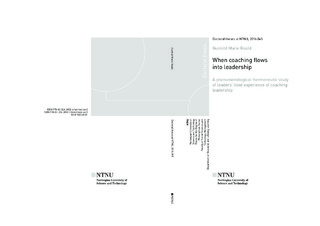| dc.description.abstract | Coaching leadership is a relatively young field of research (Hagen, 2012), where particularly the leader perspective has been scarcely investigated (Ellinger et al., 2014). The purpose of the study is to explore leaders’ lived experience of coaching leadership, and to examine how coaching influences leadership from a leader perspective. The research question guiding the study is: “How is coaching leadership experienced by leaders, and how does coaching influence leadership?” With a phenomenological-hermeneutic perspective, ten semi-structured interviews and two focus-group interviews with leaders in different Norwegian companies who have attended the same coaching course have been carried out.
The theoretical framework of the study utilises an existential-humanistic perspective on coaching leadership. The concepts of self-actualisation, acceptance, congruence, experience, mutuality and empathy are elaborated on in the theory section, primarily drawing on the person-centred theory of Carl Rogers and the theory of persons-in-relation of John Macmurray, as transferred to the counselling field by Ragnvald Kvalsund and Eleanor Allgood.
The data analysis has been inspired by the phenomenological-hermeneutic procedure suggested by Lindseth and Nordberg (2004). Three main categories have emerged as a result of this analysis: self-confidence, integration and connectedness. Within each main category, three sub-categories are found and presented.
The findings from this study indicate that the experience of coaching leadership is one of integration in that coaching “just flows into” leadership, as expressed by one of the informants. This term is not to be understood as meaning that everything the leader experiences might be explained by the coaching concept. Rather, coaching co-exists with other interventions and approaches. The leaders search for the “coachability” of a variety of situations within their leadership, that is, aspects of a particular context that are suitable for assuming a coaching approach. Furthermore, the findings suggest that coaching leadership involves an experience of self-confidence: leaders feel better equipped to perform their leadership as a result of having learned about coaching and applied it within their leadership, or learning about coaching becomes a confirmation of their leadership experience and thus to one’s employees: taking a coaching approach in encounters with employees entails an experience of discovering the person behind the employee and thus interacting on a more existential, personal level.
In the discussion, the relevance of giving space to the experiential dimension of conversations and encounters within leadership is emphasised, and the question of mutuality is addressed and discussed as a not yet fully realised potential of coaching leadership. | nb_NO |
